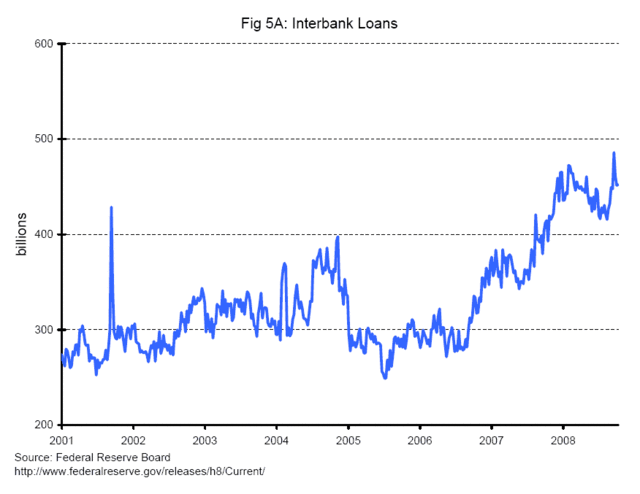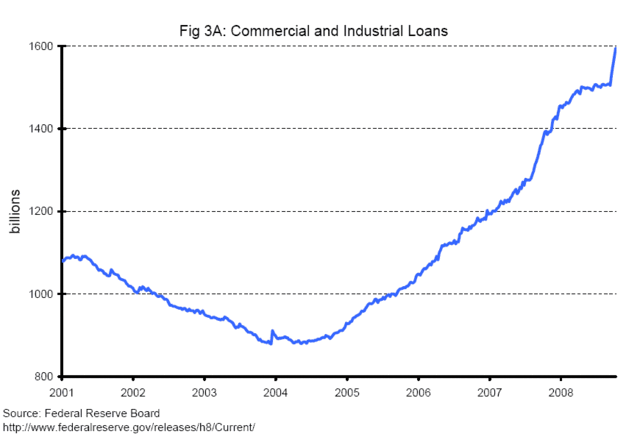You Heard It Here First
I said it a couple of weeks ago:
Economists will be poking through this situation years from now, and may well find the bunkers
empty of WMD's. Another trillion dollar commitment and unprecedented
expansion of executive power ramrodded on the back of fear mongering
and chicken-little crisis declaration.
And even before that on October 1
Well, they're picking through the bunkers now, and its not at all clear the threat was what it was portrayed to be. The Fed of Minneapolis debunks four myths (pdf)
Myth 1. Bank lending to non…nancial corporations and individuals has declined sharply.
Myth 2. Interbank lending is essentially nonexistent.
Myth 3. Commercial paper issuance by non…nancial corporations has declined sharply and rates have risen to unprecedented levels.
Myth 4. Banks play a large role in channeling funds from savers to borrowers.
Apparently, others are starting to make the WMD comparison.
A couple of examples below. First, sure looks like all the inter-bank lending has dried up:
Yep, and no one is lending to Main Street businesses either, so we better do something!
Just to avoid confusion, that upward spike began in September, well before the Lehman bankruptcy. Similar stories in commercial paper, consumer lending, leases, etc. See the whole thing.


Yup! Credit crisis threat disaster scare = WMD threat disaster scare = global warming threat disaster scare...
A very interesting article from the Minneapolis Fed, and the graphs make a compelling case for an overblown 'crisis'. However, I wish they had talked a bit about the recent LIBOR spreads and other yield spreads and how they either confirm or are immaterial in identifying a true credit crisis.
I'll have to beg to differ based on personal experience. I'm involved in expanding a business right now, and small business loans seem to be nearly impossible to get (despite good business fundamentals, stuff that in "normal times would be a slam-dunk," etc). I have a friend that works in commercial banking for a very, very large bank who told me off the record that they're not doing any loans right now unless they have a prior contractual obligation. I'm not sure how long this freeze will last - at the end of the day banks have to lend money to make money, but here on the ground things are quite cold, if not frozen.
Eric,
How are you defining "normal times"? In the past few years credit spreads have been tightening to abnormally low levels. In addition to credit spreads widening to more normal levels, they've widened to include the increased economic uncertainty we now face. I doubt that loans are completely unavailable to small business. It's more likely that the loans are not being offered on terms those businesses would prefer. Are you sure your friend wasn't exaggerating a bit?
Sorry, no time to discuss, but see here:
Non-Myths about the Financial Crisis
I would be stunned if you could find anyone who is actually familiar with commercial credit markets who would say there hasn't been a massive decrease in the abilty to get new loan commitments.
I am a regular participant in the credit markets trying to acquire credit, and as of now it is just about impossible. To push the analogy, you are having an intellectual debate about whether there are WMD while I see people I do business with glowing like Chernobyl.
These statistics are obvioiusly not capturing a very real and pronounced phenomenon.
Why, I don't know exactly. I suspect part of it is that companies have been drawing down their pre-existing credit lines. I have heard stories of this being done out of panic that a) banks may not honor them later; b) there may not be other sources of financing available when they are needed.
So, I suspect, there is a very important difference between "loans outstanding" and "new credit commitments extended". Find some data on new credit commitments over the last few years, and you won't have any doubt there was some WMD set off in the credit markets.
The current crisis is completely congruent with the Bush administration's operating model: Torture people to get compliance, or hold a gun to their head to get their money. See by Naomi Klein for the startling revelation that [gasp!] the administration fomented a war in Iraq when there was none to create the deregulated paradise their theorists have so heavily promoted.
Incidentally, the Non-Myths about the Financial Crisis link to Cato posted by Mesa Econoguy above is an interesting read. It points out that the current crisis is in non-bank entities that have created an unregulated shadow banking system.
You know it's pretty bad when a Cato scholar demonstrates that the regulated entities are not the problem, it's those deregulated ones...!
Eric the Reds post is anecdotal and so is this one, but I too am on the front lines of commerical credit. I arrange financing for small to midsized businesses with regional and national banks and lenders. My recent experience has been that for every bank reticent to make loans there are 3 eager to do the deal. I frequently get emails from my bank contacts asking for business. The perception that banks will not lend is being driven by the media and then passed along by those who are uninformed. For those banks who have indeed tightened up, I have yet to see them reject a profitable deal. I have seen them turn away from those on the margin. Maybe not a bad decision.
wkits,
Just wondering on what terms those deals are being done. Worse, same?
diz is correct. I am an investor in at least two companies that drew down their entire credit lines in the last month prior to Lehman. One was with CIT, so it was a very smart decision. Outstanding credit definitely does not equal new commitments. Also, a lot of credit origination in 2006/2007 was LBO debt, and that has definitely plummeted. I don't see how the chart is correct.
The perception that banks will not lend is being driven by the media and then passed along by those who are uninformed. For those banks who have indeed tightened up, I have yet to see them reject a profitable deal. I have seen them turn away from those on the margin. Maybe not a bad decision.
I don't know what kind of lending you are talking about. I think in the smaller mom and pop markets there may be local banks still active, largely unaffected.
I work regularly with dozens of big name money center banks. I talk to bankers every day about new $10-100 million loans for mergers & acquisitions, and gorwth projects. It's pretty much dead right now. I find claims that there is not a credit crunch right now downright absurd.
Did you really say that? As a Harvard MBA and a Princeton undergrad, your lack of basic understanding of economics is startling and frightening. Perhaps you heard of the CP market? You at least should know Fannie and Freddit collapsed, right? geez, the ignorance. even GE, one of the largest companies in the world with billions of assets, needed to sell its stock to Buffett for 10% discount to is market price because the CP market dried up and they had cash flow problems. Everyday, the CP market is contracting by 8-10% (get on a bloomberg and see it for yourself) AIG used 90 of its 123 billion dollar loan from the government, 20 billion just in the past 2 weeks as credit conditions worsened and CDS payouts increased. I'm shocked at not only the delusion, but also the blind idiocy
As a Harvard MBA and a Princeton grad, your basic understanding of economics far exceeds most other Harvard and Princeton grads I've read.
Methinks,
Terms are less favorable relative to the past few years, especially in terms of collateral required as lenders/underwriters try to further backstop any risk and protect their own jobs. The pendulum may have swung a bit too far, but in my opinion we need a period of tightended standards. Rates remain historically low.
Diz,
I work with businesses seeking funding from $1m - $50m and with the largest 20 banks. You have certainly had a slightly different experience than me. The point of my post is that although lending practices have changed, the notion that businesses cannot get loans even for economically viable projects, is simply not true. Credit has become less available over the past 2 years as the market returns to a less inflationary environment.